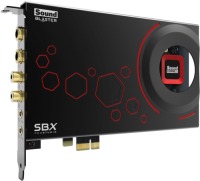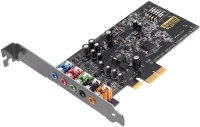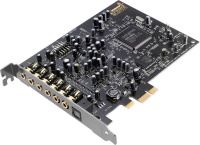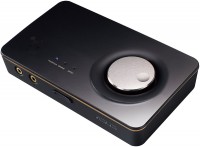Sennheiser GSX 1000
 | Outdated Product $289.98 Features: gaming; Type: external; Interface: USB; Channels: 7.1; DAC resolution: 24; Max. sampling rate (kHz): 96; |
|
| |||||||||||||||||||||||||||||||||||||||||||||||||
Always clarify the specifications and configuration of the product with the online store manager before purchasing.
Catalog Sennheiser 2025 - new arrivals, bestsellers, and the most relevant models Sennheiser.
Gaming hybrid
The German company Sennheiser, which has long enjoyed the respect of audiophiles, has recently taken up the video game market. Following a pack of gaming headphones, Sennheiser showed a rather interesting device GSX 1000, which is positioned not so much as a sound card, but as an amplifier for gaming headphones with USB power supply.
Plug-n-play and frequency range from 2 to 48,000 Hz
GSX 1000 is notable for several things: plug-n-play mode with no drivers (all settings are embedded in the card, so they are called directly from it), a large number of different gaming modes, and an excellent multi-channel mode. The company does not disclose information about the DAC and the amplifier circuit. It is only known that the DAC operates according to the 96 kHz + 24 bit scheme, the frequency range is impressive (2 - 48,000 Hz), and the amplifier is compatible with headphones with an impedance of 16 to 150 Ohms. That is, it is not suitable for high-impedance music lovers' headphones.
Honest sound and excellent virtualization
In terms of sound, the GSX 1000 delivers the most honest reproduction without noticeable coloring and protruding its own character. Everything is okay here, but without enthusiasm. We saved them for the virtual 7.1 mode of Sennheiser's own design. It competently "squeezes" part of the lows, middle and part of the highs, highlighting the most important spectrum in games from 2 to 15 kHz, allowing you to clearly hear where steps and shots come from. Judging by the words of the company's engineers, this was the purpose of creating this device, because the simulation of multi-channel sound in conventional sound cards and even fairly expensive gaming headphones in 99% of cases leaves much to be desired.
Memorable design
Finally, let's note the design of the GSX 1000. This futuristic geometrically verified box with a large round display looks like it belongs on any table. It can safely be called a gaming gadget, but it is alien to their kitsch. The huge aluminum volume control ring that encircles the large information display is a separate song. It has a very soft, simply airy stroke, thanks to which it is pleasant to turn it just like that, even if the device is turned off. Plus, the amplifier has a built-in proximity sensor, thanks to which the display lights up as soon as you bring your hand to it. After a few seconds, it smoothly fades out, all additional settings such as equalization and sound profiles disappear, and only the volume indicator remains. The only downside of this visual feast is the easily soiled case, which actively collects fingerprints.
















